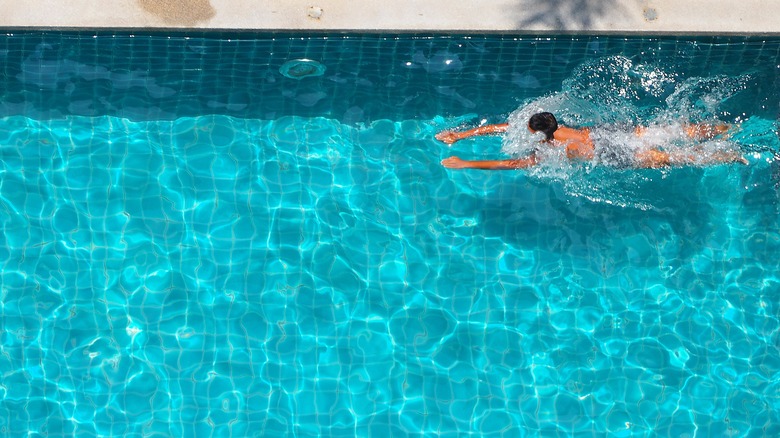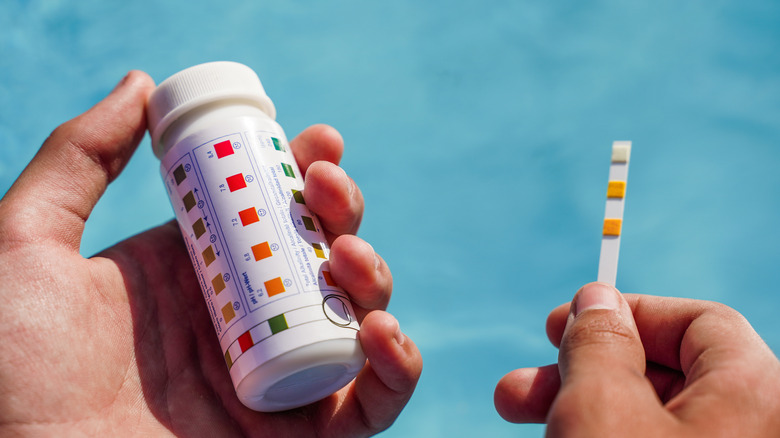How To Properly Clean A Pool
We've all probably visited the house of someone who has a pool and left the gathering wishing we had one of our own back home. In addition to the many benefits to your body and mind, having a pool can also mean great pool parties. Let's not forget, however, that it's not all fun and games. Owning a pool comes with its own challenges, one of which is knowing how to properly clean one.
Simply adding chlorine or sanitizing water to your water every now and again is not enough to keep your pool clean (via Swim University). While chemicals ensure the water stays clean, they don't necessarily keep the walls, floor, and surrounding areas of your pool from getting dirty; nor do they prevent leaves and bugs from gathering in the water.
Before you start to properly clean your pool, you have to ensure you have all the necessary cleaning equipment. The bare essentials include things like a pool brush, tile soap, telescopic pole, garden hose, pool vacuum, leaf net, water testing equipment, and chemicals (per Forbes). It might also help to have additional equipment like a robotic pool cleaner and suction-side pool cleaner, according to Swim University.
This is the best way to clean a pool
Once you've taken an inventory of your cleaning supplies, you're ready to begin. Skimming off any surface debris is your first order of affairs. In fact, this chore should be added to your daily activities list if you're a pool owner, especially if you are to make sure that your pool is free of leaves, twigs, etc. (via My Perfect Pool).
Next, you can move on to brushing the sides and floor of your pool. This step will prevent algae buildup, according to Real Homes. It's also a good idea to brush your pool walls clean weekly, as My Perfect Pool reported.
Vacuuming the pool is your next step. Simply assemble your manual pool vacuum and you're good to go. Swim University recommends vacuuming your pool every other day. If vacuuming manually is too cumbersome for you and if you don't mind spending some extra bucks to maintain your pool, you can go ahead and get yourself a robotic pool cleaner. Also called an automatic pool cleaner, this handy device will do most of your cleaning for you (via Swim University)
The importance of managing your pool's chemical levels
After cleaning, you can go ahead and test your pool water's pH levels using a pH tester. It's best to check your pool's chemical levels two times each week from June through August, as My Perfect Pool suggests. Ideal chemical levels are a pH between 7.4-7.6 and chlorine of 2-3 ppm.
Cleaning a pool filter is likely one of the more important tasks. An important pre-pool cleaning tip, according to Real Homes, is clearing the water by leaving the filter on for a few days. Once the pressure gauge reaches 10 psi higher than where it normally is, you're ready to clean your filter: this can be done by taking out the cartridge and washing it with a hose. INYO Pools urges pool owners to add sanitizing chlorine tablets to ensure the water is bacteria-free and clean.
Regular pool maintenance can ensure you enjoy your favorite summertime activity without worrying about your health and safety. While you can get the help of experts on and off to ensure everything is in order, you can also ensure the longevity of your pool if you learn to properly clean it yourself.

